The Harry Potter series has been translated from the original English into several other languages.
List of translations by language
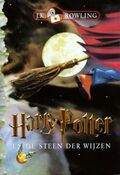
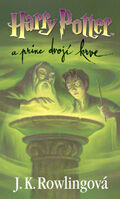
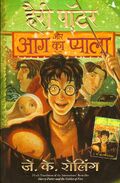
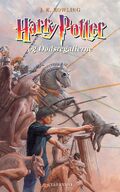
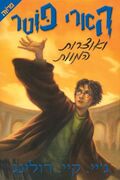

The original British English versions of the book were published in the United Kingdom by Bloomsbury. Official translations have been done in the following languages (languages are listed twice if more than one translation was prepared, once if the difference is merely a difference of country and distributor):
- Afrikaans, South Africa: Human & Rousseau (pty) Ltd., translated by Janie Oosthuysen[1] (I-V) and Kobus Geldenhuys (VI-VII)
- Albanian, Albania: Publishing House Dituria, translated by Amik Kasoruho
- Arabic, Egypt: Nahdet Misr, translated by Sahar Gabr
- Armenian, Armenia, Antares Publishing, translated by Eleonora Azaryan
- Asturian, Spain: Ediciones Trabe,[2] translated by Xesús González Rato (I)
- Azerbaijani, Azerbaijan: Qanun Publishing House[3]
- Basque, Spain: Ediciones Salamandra / Elkarlanean, translated by Iñaki Mendiguren
- Bengali, Bangladesh: Ankur Prakashani
- Breton, Britanny, France: An Amzer, translated by Mark Kerrain
- Bulgarian, Bulgaria: Egmont Bulgaria,[4] translated by Mariana Melnishka[5] (I-IV), Emiliya L. Maslarova (V-VI)
- Catalan, (visca) Catalonia, Spain: Editorial Empúries, translated by Laura Escorihuela (I-IV), Marc Alcega (IV), Xavier Pàmies (V-VI)
- Chinese (Simplified): People's Literature Publishing House,[6] translated by Su Nong (I) (苏农), Ma Aixin (II, IV, V) (马爱新), Zheng Xumi (III) (郑须弥), Ma Ainong (V) (马爱农), and Cai Wen (V) (蔡文)
- Chinese (Traditional): Crown Publishing Company Ltd,[7] translated by Peng Chien-Wen (彭倩文; Peng Qianwen)
- Croatian, Croatia: Algoritam,[8] translated by Zlatko Crnković (I-III), Dubravka Petrović (IV-VI)
- Czech, Czech Republic: Albatros, translated by Vladimír Medek (I, II, IV), Pavel Medek (III, V, VI, VII)
- Danish, Denmark: Gyldendal, translated by Hanna Lützen (all 7 and 'Beedle the Bard')
- Dutch, Netherlands and Belgium: Standaard Uitgeverij/Uitgeverij De Harmonie (I-VII), translated by Wiebe Buddingh'
- English (non-UK editions, no translations): Australia, Allen & Unwin Pty Ltd (Distributor); Canada, Bloomsbury/Raincoast;[9] South Africa, Jonathan Ball Publishers (Distributors)
- English (American), United States: Arthur A. Levine Books
- Estonian, Estonia: Varrak Publishers,[10] translated by Krista and Kaisa Kaer
- Faroese, Faroe Islands: Bokadeild Foroya Laerarafelags,[11] translated by Gunnar Hoydal (I-III), Malan Háberg (IV) and Bergur Rasmussen (V-VII)
- Finnish, Finland: Tammi,[12] translated by Jaana Kapari-Jatta (all 7, plus the additional books)
- French, France, Canada, Belgium, and others: Gallimard Jeunesse, translated by Jean-François Ménard (all 7, plus the 2 "school books")
- Galician (Galego), Spain: Ediciones Salamandra, translated by Marilar Aleixandre
- Georgian, Georgia: Bakur Sulakauri Publishing,[13] translated by Manana Antadze (I), Davit Gabunia (II, III), Ketevan Kanchashvili (IV, VI), I.Beriashvili (V), Tsitso Khotsuashvili (VII)
- German, Germany: Carlsen Verlag,[14] translated by Klaus Fritz (all 7 books, plus the additional books)
- Low German, Germany: Verlag Michael Jung, translated by Hartmut Cyriacks, Peter Nissen et al.
- Greek (modern), Greece: Psichogios Publications,[15] translated by Máia Roútsou (I), Kaíti Oikonómou (II-V)
- Greek (ancient): Bloomsbury, translated by Andrew Wilson[16][17]
- Greenlandic, Greenland: Atuakkiorfik Greenland Publishers, translated by Stephen Hammeken
- Gujarati, India: Manjul Publishing House Pvt. Ltd., translated by Jagruti Trivedi and Harish Nayak
- Hebrew, Israel: Miskal / Books in the Attic Ltd., translated by Gili Bar-Hillel (All 7 books, Fantastic Beasts and Where to Find Them, Quidditch Through the Ages and The Tales of Beedle the Bard)
- Hindi, India: Manjul Publishing House Pvt. Ltd.,[18] translated by Sudhir Dixit[19] (I-IV)
- Hungarian, Hungary: Animus Publishing,[20] translated by Tóth Tamás Boldizsár
- Icelandic, Iceland: Bjartur, translated by Helga Haraldsdóttir (I-VI) and Jón Hallur Stefánsson (V)
- Indonesian, Indonesia: Penerbit PT Gramedia Pustaka Utama, translated by Listiana Srisanti[21] (I-V)
- Irish: Bloomsbury, translated by Máire Nic Mhaoláin, released October 4, 2004 (I)
- Italian, Italy: Adriano Salani Editore, translated by Marina Astrologo (I-II), Beatrice Masini[22] (III-V) and illustrated by Serena Riglietti
- Japanese, Japan: Say-zan-sha Publications Ltd.,[23] translated by Yuko Matsuoka[24]
- Khmer, Cambodia: University of Cambodia Press, translated by Un Tim[25][26]
- Korean, Korea: Moonhak Soochup Publishing Co., translated by Kim Hye-won (I-IV), Inja Choe (V-VII)
- Latin: Bloomsbury, translated by Peter Needham (I-II)
- Latvian, Latvia: Jumava, translated by Ingus Josts (I-VI), Ieva Kolmane (IV-VI), Sabīne Ozola (V), Māra Poļakova (V)
- Lithuanian, Lithuania: Alma Littera Company Limited, translated by Zita Marienė (all 7)
- Macedonian, Republic of Macedonia: Publishing House Kultura
- Marathi, India: Manjul Publishing House Pvt. Ltd., translated by Shukla Vikas
- Malay, Malaysia: Pelangi Books
- Malayalam, India: Manjul Publishing House Pvt. Ltd., translated by Dr Radhika C. Nair
- Norwegian, Norway: N.W. Damm & Son A.S., translated by Torstein Bugge Høverstad[27] (all 7)
- Persian, Iran: Tandis Books, translated by Saeed Kebriyaee (I), Vida Eslamiyeh (II-VII)[28] / Ghazal, translated by Saeed Kebriyaee (I), Nahid (I-V)
- Polish, Poland: Media Rodzina of Poznań, translated by Andrzej Polkowski (all 7)
- Portuguese, Portugal: Editorial Presença, translated by Isabel Fraga (I), Isabel Nunes and Manuela Madureira
- Portuguese, Brazil: Editora Rocco Ltda., translated by Lia Wyler
- Romanian, Romania: Egmont Romania, translated by Ioana Iepureanu, Editura Arthur translated by Florin Bican (I) and Tatiana Dragomir (II)
- Russian, Russia: Rosman Publishing (2000-2013), translated by Igor W. Oranskij (I), Marina D. Litvinova (II-V), Vladimir Babkov (V), Viktor Golyshev (V), Leonid Motylev (V), Sergei Iljin (VI), Maya Lahuti (VI); Machaon Publishing (2013-), translated by Masha Spivak
- Scots Gaelic, Bloomsbury,[29] scheduled for December, 2006 (postponed)
- Serbian, Serbia: Alfa – Narodna Knjiga (I-VI) & Evro-Giunti (VII), translated by Vesna Roganović & Draško Roganović (I-VII); Ana Vukomanović (II)
- Sinhala, Sri Lanka; unauthorised translations[30]
- Slovak, Slovakia: IKAR, translated by Jana Petrikovičová (I-II) Oľga Kralovičová (III-VII)
- Slovene, Slovenia: Epta, translated by Jakob J. Kenda (I-V) and Mladinska knjiga,[31] translated by Jakob J. Kenda (VI-VII)
- Spanish (Castilian), Spain and Latin America: Emece Editores / Ediciones Salamandra,[32] translated by Alicia Dellepiane Rawson (I), Adolfo Muñoz Garcia (II-IV), Nieves Martín Azofra (II-IV), Gemma Rovira Ortega (V-VI)
- Swedish, Sweden: Tiden Young Books / Raben & Sjögren, translated by Lena Fries-Gedin (all 7)
- Tamil, India and Sri Lanka; rumoured unauthorised translation
- Thai, Thailand: Nanmee Books, translated by Sumalee Bumrungsuk (I-II, V), Waleephon (III), Ngarmphan Wetchacheewa (IV)
- Tibetan, People's Republic of China: Tibet People's Publishing House, translated by Norgy Puchunggal (I-II); may be an unauthorised translation
- Turkish, Turkey: Yapı Kredi Kültür Sanat Yayıncılık, translated by Mustafa Bayindir, Ülkü Tamer (I), Sevin Okyay (II) and Sevin Okyay & Kutlukhan Kutlu (III-VII)
- Ukrainian, Ukraine: A-BA-BA-HA-LA-MA-HA, translated by Victor Morozov (I-V), and Sofiia Andrukhovich (IV)
- Urdu, Pakistan: Oxford University Press, translated by Darakhshanda Asghar Khokhar (I-III)
- Valencian, Spain: Editorial Empúries
- Vietnamese, Vietnam: Tre Publishing House, translated by Lý Lan[33]
- Welsh (UK), translated by Emily Huws[34]
Some sources refer to translations "from Arabic to Zulu", but the books have never officially been translated into Zulu.
Some translations, such as those to the dead Latin and Ancient Greek, were done as academic exercises, to stimulate interest in the languages and to give students of those languages modern texts to read. The Ancient Greek version, according to the translator, is the longest text translated into Ancient Greek in over 1500 years, and took one year to complete.
Note that in some countries, such as Spain and India, the book has been translated into several local languages (see section on publishers); sometimes the book has been translated into two dialects of the same language in two countries (for example, Portuguese versions for Brazil and Portugal).
Issues in translation
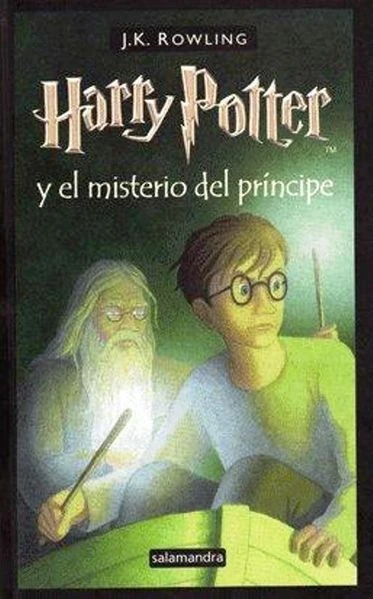
As with many texts, the Harry Potter series presents some special challenges to translators:
Culture
The cultural environment of the book is decidedly English. The stories follow a familiar theme in English children's books, that of adventures at boarding school, and many of the cultural nuances will be unfamiliar to readers in translation. Such things require careful and creative translating.
Language
The language of the books, reflected, for example, in Hagrid's manner of speaking, reveals much about the various characters. Various expressions and forms of speech are regional. Scholastic executives chose to issue the books with some adaptations to American English[35], a practice which is quite common with books that "cross the pond" in either direction, but which was met with a certain amount of reader outrage in the case of Harry Potter.[citation needed]
A significant change was made to the American edition of the first book (which was also reflected in the title of the first movie when distributed in that country) in that Harry Potter and the Philosopher's Stone was retitled Harry Potter and the Sorcerer's Stone (with applicable changes to the text). Although translated titles often result in wording changes, this is a rare care when a non-UK edition in a common language, English, was so retitled.
The varying word order in different languages often presented a problem for translators in cases where characters were interrupted before finishing their sentence. For instance, in Harry Potter and the Deathly Hallows, Ron Weasley asks "Why in the name of Merlin's saggy left..." before being interrupted by Arthur Weasley, who tells him not to speak to his mother like that. This presented problems in languages such as Spanish and Hebrew where nouns are used before adjectives, since Ron never states what body part or object of Merlin is saggy and on his left side. This forced translators to either rearrange the sentence or simply guess what the noun was supposed to be.
Invented words and proper nouns
Several words and phrases in the books such as spells, incantations, magical words, items and place names were invented by Rowling. Many of the spells are drawn from or inspired by Latin, and have a certain resonance with English speakers. For example, priori incantatem (a spell which causes the last spells performed by a wand to be reproduced in reverse order) would be familiar to many English-speaking readers as the words prior ("previous") and incant ("recite, utter"). Some translators have created new words themselves, others have resorted to transliteration.
Names such as Knockturn Alley and the Pensieve are extremely difficult to translate. The latter is a magical bowl into which memories and thoughts can be placed and examined at leisure, and is a portmanteau of two words: pensive, meaning "musingly or dreamily thoughtful", and sieve, a type of bowl with perforations through which fine particles of a substance (such as flour) may be passed to separate them from coarser ones. The name Knockturn Alley, an unsavoury section of Diagon Alley (the place where London's magic market is located), suggests something beaten up or twisted, and is also semi-homophonous with "nocturnally", suggesting darkness and, by extension, evil. Translators must use creativity and sensitivity in rendering such names, and some are more successful than others. Some translators chose completely different names, like in the Danish editions, where Knockturn Alley is called Tusmørkegyden, which means "Twilight Alley" and the Pensieve is called Mindekarret, which means "The Memory Bowl".
Anagrams
The name "Tom Marvolo Riddle", first mentioned in Harry Potter and the Chamber of Secrets, is rearranged to spell "I am Lord Voldemort". This has required translators to alter Riddle's name to make the anagram work. Sometimes translators manage to alter only one part of the name: Tom Riddle's middle name of Marvolo was changed to Servolo in Brazilian Portuguese, Vandrolo in Hebrew, Marvoldo in Turkish, Vorlost in German, Marvoloso in Slovak, and Orvoloson in Italian.
In other languages, translators replaced the entire name to preserve the anagram. Some translations use a name that is somewhat similar to the original, such as Tom Mervolodomos Ridl in the second Serbian edition (the first edition lacked the anagram and the original name Tom Marvolo Riddle was copied), Tom Sorvolo Ryddle in Spanish, Tom Rojvol Raddle in Czech, Tom Narvolo Reddl in Russian, and Tom Musvox Ruddle in Latin.
Other translations use an entirely different name, such as in French, where Tom Elvis Jedusor ("Jedusor" is phonetically the same as "jeu du sort", which means literally "game of spell") forms an anagram for "Je suis Voldemort" ("I am Voldemort"). In Icelandic, his name is Trevor Delgome, which becomes "(Ég)Eg er Voldemort" ("I am Voldemort"), but his middle name is not used for the anagram and stays as Marvolo. In Finnish, his name is "Tom Lomen Valedro", and the anagram is "Ma(ä) olen Voldemort", meaning "I am Voldemort". In Dutch, his name is "Marten Asmodom Vilijn", an anagram of "Mijn naam is Voldemort", or "My name is Voldemort". In Norwegian, his name is Tom Dredolo Venster, an anagram of "Voldemort den store", which means "Voldemort the Great". In Swedish, his name is "Tom Gus Mervolo Dolder", an anagram of "Ego sum Lord Voldemort", where "ego sum" is Latin, not Swedish, for "I am". In Danish, his name is "Romeo G. Detlev Jr.", which becomes "Jeg er Voldemort" meaning "I am Voldemort". Here, the "G" stands for "Gåde" which means "Riddle" thus incorporating the original surname. Mostly, Romeo Gåde is used when referring to Voldemort's real name. In Ukrainian, his name is "Tom Yarvolod Redl" ("Том Ярволод Редл"), an anagram of "Ya Lord Voldemort" ("Я Лорд Волдеморт"), or "I'm Lord Voldemort"; "Yarvolod" is a fake Old Slavic name, made-up of real parts, with "yary" meaning wrathful or fervorous, and "volodar" meaning ruler or owner.
In Hungarian, Voldemort's name becomes "Tom Rowle Denem", which is an anagram of "Nevem Voldemort", with the "w" in the name becoming two "v"s. This caused an unfortunate name collision with the character Thorfinn Rowle, who first appears in Harry Potter and the Deathly Hallows, but who is not related to Voldemort. Because of this collision, in the Hungarian translation his family name was altered to Rovel of Thorfinn. The Arabic version avoids the issue entirely by having Riddle directly write out the phrase for "I am Lord Voldemort", without any anagram at all.
In many cases, these changes to the name created a problem in later books: in the English edition, a line of dialogue mentions that Tom Riddle shares his given name with Tom the bartender of the Leaky Cauldron, and this becomes a plot point. Translators who could not have foreseen this development had, in fact, given different names to Tom the bartender and to Tom Riddle, resulting in this reference having to be erased.
Plot points
In some cases, English-speaking fans have sought clues to the story's mysteries by examining the way certain parts of the books have been translated in foreign editions. The most famous case of this is the identity of the mysterious R.A.B., a character mentioned in Harry Potter and the Half-Blood Prince who is thought by many to be Regulus Black, the brother of Sirius Black. The Dutch edition of the book translates R.A.B. as 'R.A.Z'. As 'Zwart' is Dutch for 'black' (Sirius Black is called Sirius Zwarts in the Netherlands), this has been taken by some as proof of the Regulus Black theory. However, it has never been noted by Rowling, that any additional information is given to translators, so whether or not these presumptions are accurate, is still unknown. It is also interesting to note that in the Hebrew version the note had the same initials as the English version (transliterated into the Hebrew letter equivalent, ר.א.ב.). However, throughout the series, the name 'Black' is not translated into the Hebrew equivalent (שָׁחוֹר), thus leaving it the same name as in the English versions -- בְּלַק.
Similarly, the title for Harry Potter and the Order of the Phoenix did not make it obvious whether Order referred to a group of people or to a directive. The information that it was a group of people was then determined by viewing the title in some other languages.
Other issues
It has happened that translators forget that they had translated a name, thus creating more characters and objects. In the Danish translation, Millicent Bulstrode is translated to 'Polly Pitbull' in Chamber of Secrets, but not in any of the other books.
Also, in the Danish edition of Prisoner of Azkaban, two parts were mistakenly omitted (most of pages 148 and 260-261 in the British hardback edition).
A number of issues were presented in the Hebrew translations of the novels, as it was believed the predominately Jewish readers would not understand the various references to Christianity. In some cases, this was resolved by replacing them with similar references to Judaism. For instance, in Harry Potter and the Order of the Phoenix, Sirius Black sings a parody of the Christmas carol "God Rest Ye Merry Gentlemen." In the Hebrew version, this is replaced with a parody of the traditional Chanukah song "Mi Yimalel."
Pirate translations
From the first book in the series onwards, individuals have illegally produced unauthorised "pirate" translations of the novels, some of which have been released far ahead of the official translation in some languages.[36] One notable example occurred in Venezuela in 2003, when an illegal translation of the fifth book, Harry Potter and the Order of the Phoenix, appeared soon after the release of the English version and five months before the scheduled release of the Spanish translation. The pirate translation was apparently so bad that the translator added messages, including "Here comes something that I'm unable to translate, sorry," and "I'm sorry, I didn't understand what that meant" in some sections. Two people were arrested by the Venezuelan National Police in connection with the pirated version.[37]
There was also a pirate translation in Spain of Harry Potter and the Half-Blood Prince that reached Latin America and became very popular but was a very bad one. The title of the pirate version was Harry Potter y el príncipe mestizo (the literal translation), while the official publishing in Spain was Harry Potter y el misterio del príncipe—literally translated as "Harry Potter and the mystery of the prince". This title, however, was the same one given to the movie translation in both Latin America and Spain regions.[citation needed]
There was also a pirate translation for Harry Potter and the Deathly Hallows made in Latin America. This translation wasn't very popular, however, and the most sold version was the official one, titled as Harry Potter y las Reliquias de la Muerte; literally translated.
Another notable example was an internet community, Harry auf Deutsch,[38] formed to translate the Harry Potter books into German more rapidly. After being prevented by the German publisher from openly releasing their translations, they converted their project a community site which (1) translates the books for the enjoyment of their own members (thus avoiding copyright issues, apparently)[citation needed], (2) translates fan fiction, (3) discusses discrepancies in the official translations, and (4) creates their own lexicon.[citation needed]
The agents representing J. K. Rowling have stated in the past that they can not and do not intend to prevent individuals from translating Rowling's books for their own personal enjoyment, as long as the results are not made available to the general public.[36]
In 2007, there was a now defunct Spanish webpage titled Spanish Hallows in which there was a pirate translation of Deathly Hallows, however, the site was destroyed by hackers not long ago.
Fake translations
Whereas "pirate translations" are unauthorised translations of true Harry Potter books, "fake translations" have also appeared, which are published pastiches or fanfics that a foreign publisher has tried to pass off as the translation of the real book by Rowling. There have been several such books, the most famous of which is probably Harry Potter and Bao Zoulong which was written and published in China in 2002, before the fifth book in the series, Harry Potter and the Order of the Phoenix, was released.
Other fake Harry Potter books written in Chinese include Harry Potter and the Porcelain Doll,[39] Harry Potter and the Golden Turtle,[40] and Harry Potter and the Crystal Vase.[40] In Bengali, Harry Potter Kolkataye (Harry Potter in Calcutta), written by Uttam Ghosh, has appeared.[41]
Notes and references
- ↑ Janie Oosthuysen
- ↑ Harry Potter y la piedra filosofal
- ↑ Qanun.Az
- ↑ Egmont Bulgaria
- ↑ Potter-mania reaches Bulgaria
- ↑ [1]
- ↑ Crown Publishing Company Ltd
- ↑ Algoritam
- ↑ From http://www.raincoast.com/faq: Raincoast Books was the joint publisher of Harry Potter series in Canada in conjunction with Bloomsbury Plc of London from 1999 until 2010. The Canadian editions of all the Harry Potter books have the original British text intact, the same title and feature the original cover artwork. New editions are only made if there are significant changes to the text or format. In new editions, J.K. Rowling has corrected some parts of the text.
- ↑ Varrak Publishers
- ↑ Bokadeild Foroya Laerarafelags
- ↑ harrypotter.fi
- ↑ Sulakauri
- ↑ Carlsen Verlag
- ↑ Psichogios
- ↑ Harry Potter in Ancient Greek (The Classics Pages)
- ↑ Translating 'Harry Potter' to Ancient Greek
- ↑ Manjul India
- ↑ Harry Potter speaks Hindi, dons adrishya cloak
- ↑ libri.hu
- ↑ Harry Potter translator taking it one page at a time
- ↑ Interview with the Italian Rowling
- ↑ Say-zan-sha
- ↑ From mourning to 'magic'
- ↑ [2]
- ↑ [3]
- ↑ Norwegian Potter Translator answers fan questions - SnitchSeeker.com
- ↑ [4]
- ↑ Potter translated to Scots Gaelic
- ↑ Potting Pirates
- ↑ Mladinska knjiga
- ↑ Salamandra
- ↑ Phỏng vấn cô Lý Lan - Harry Potter's Fans Viet Nam
- ↑ ic Wales - Harri's friend wants to meet JK
- ↑ List of changes in the American editions
- ↑ 36.0 36.1 Harry Potter and the Internet Pirates
- ↑ "Potter pirate sorry for mistakes", BBC News, 3 September 2003
- ↑ Harry auf Deutsch
- ↑ Harry Potter and the Porcelain Doll
- ↑ 40.0 40.1 Harry Potter and the Battle of the International Copyright Law
- ↑ [5]
External links
- Article from "Translorial", Part I, Part II
- The Sphinx's Song in 13 languages
- international cover gallery
- Harry Potter name and word equivalents in many languages
- Database of Harry Potter terms and chapter titles in different languages
- Dictionary of Dutch Harry Potter terms
- Dictionary of Norwegian Harry Potter terms and names
- Harry Potter in Chinese, Japanese and Vietnamese translation
- English - German Dictionary + Lexicon of Harry Potter terms and names
- Platform 9 3/4: Crown Publishing (Taiwan) site containing lists of names, books, spells, quidditch terms, etc. in Chinese and English
- Article about American English "translation"
- short article on translation differences in Harry Potter
- Harry Potter terms in Japanese
- Financial Times article
- Petition to help publish an Esperanto translation of Harry Potter
| J. K. Rowling's Harry Potter series | |||||
|---|---|---|---|---|---|
| Philosopher's Stone | book | film | games | film soundtrack | game soundtrack |
| Chamber of Secrets | book | film | games | film soundtrack | game soundtrack |
| Prisoner of Azkaban | book | film | games | film soundtrack | game soundtrack |
| Goblet of Fire | book | film | games | film soundtrack | game soundtrack |
| Order of the Phoenix | book | film | game | film soundtrack | game soundtrack |
| Half-Blood Prince | book | film | games | film soundtrack | game soundtrack |
| Deathly Hallows | book | film 1 | games 1 | film soundtrack 1 | game soundtrack 1 |
| film 2 | games 2 | film soundtrack 2 | game soundtrack 2 | ||
| Cursed Child | script | play | |||
| Fantastic Beasts film series | |||||
| Fantastic Beasts and Where to Find Them | book | screenplay | film | game | film soundtrack |
| The Crimes of Grindelwald | screenplay | film | film soundtrack | ||
| The Secrets of Dumbledore | screenplay | film | film soundtrack | ||